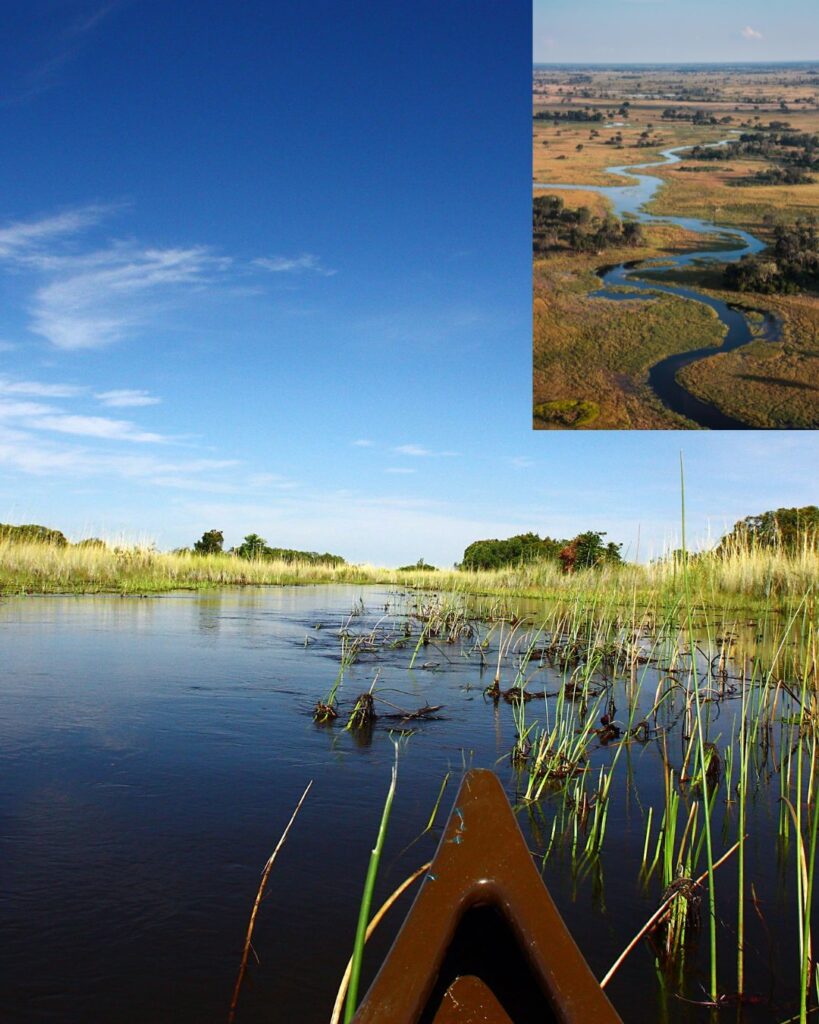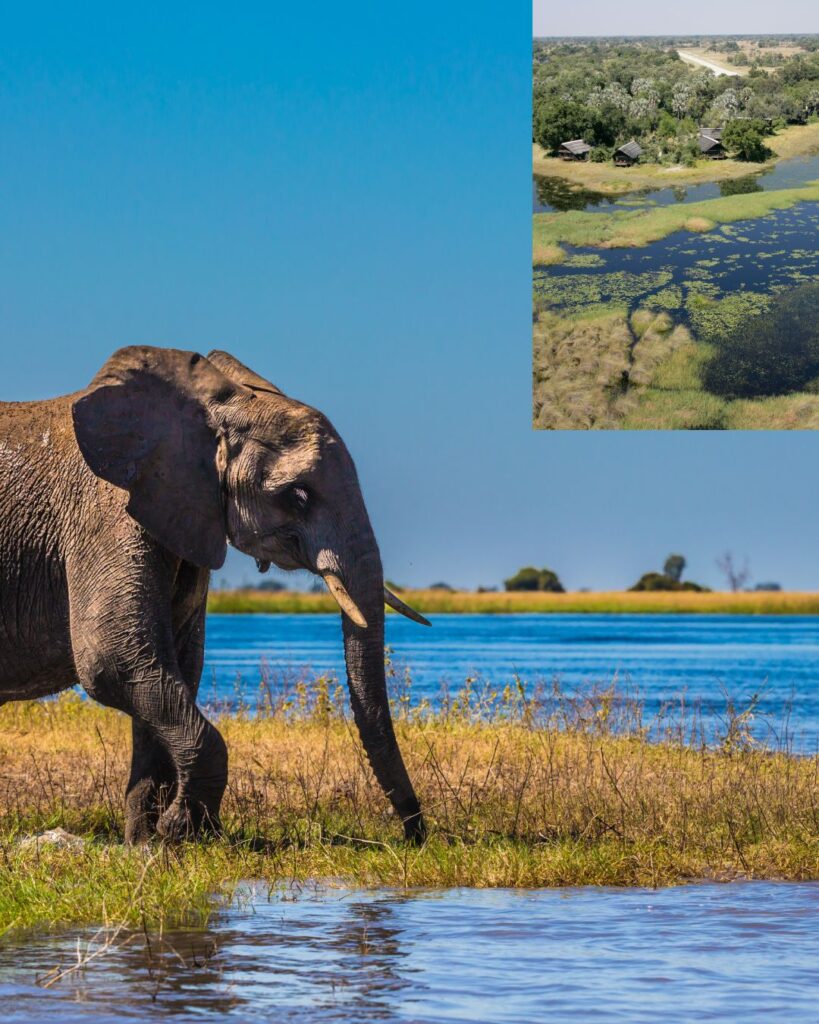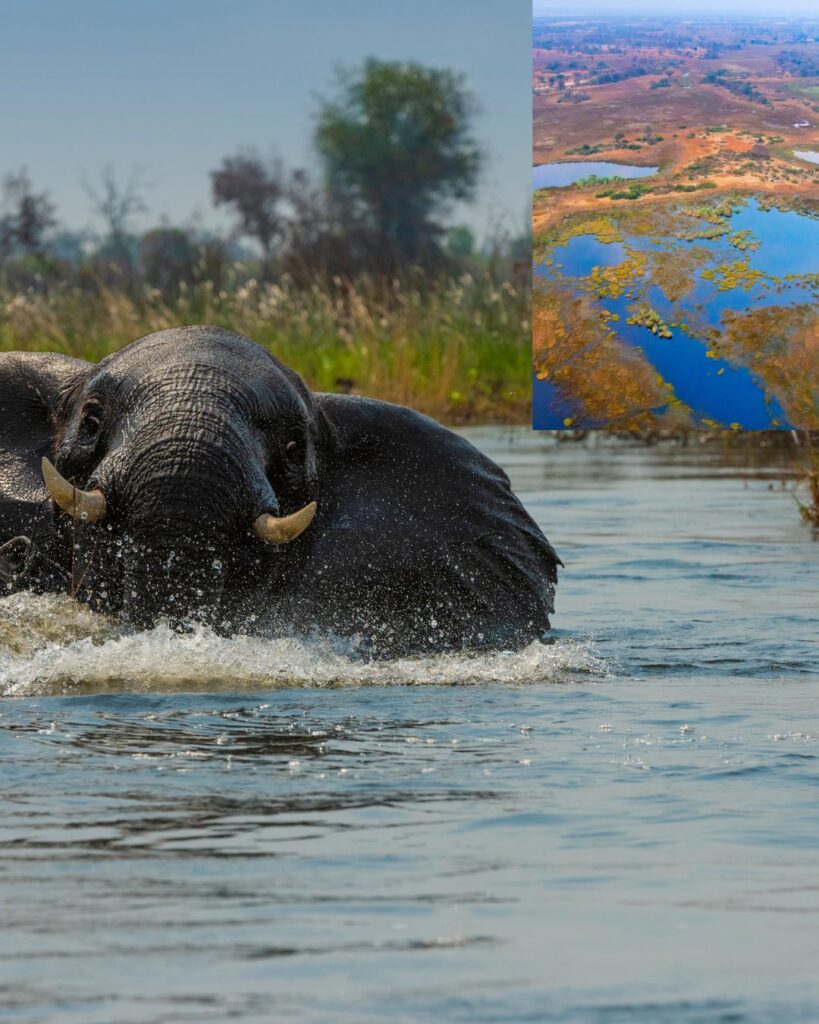The Okavango Delta in Botswana stands as one of Africa’s most spectacular wilderness areas. While most visitors explore its waterways from the safety of motorized boats or guided tours, a small but growing number of adventure seekers are choosing a more intimate approach: kayaking. And not just any kayaking—kayaking in waters shared with Nile crocodiles, some of the most formidable predators on the planet.
The Ultimate Wilderness Adventure
There’s something primal about slipping silently through the crystal-clear channels of the Okavango in nothing but a small plastic vessel. Each paddle stroke brings you closer to nature in its rawest form—birds taking flight at your approach, hippos grunting their displeasure, and yes, the occasional crocodile gliding beneath the surface. This is not an adventure for the faint of heart, but for those seeking an authentic wildlife experience, few activities compare.
The Okavango Delta forms when seasonal floodwaters from the Angolan highlands flow into a tectonic trough in the central Kalahari Desert. This creates a unique inland delta system covering up to 15,000 square kilometers during peak flooding—a paradise for wildlife and adventure seekers alike.
Understanding the Risks
Before anyone considers embarking on this adventure, it’s crucial to understand what you’re signing up for. Nile crocodiles are apex predators that can grow up to 6 meters long. They are responsible for hundreds of human fatalities across Africa annually. In the Okavango, they share the waters with:
- Territorial hippopotamuses (often more dangerous than crocodiles)
- Venomous water snakes
- Aggressive bull elephants that may cross channels
- Unpredictable weather conditions
Yet with proper preparation, qualified guides, and appropriate safety protocols, kayaking in crocodile territory can be done with calculated risk.
How to Safely Kayak the Okavango
Safety in these waters is never guaranteed, but there are ways to minimize risks:
- Never go alone. Always paddle with professional guides who know crocodile behavior and local conditions.
- Use specialized kayaks designed for stability and wildlife viewing.
- Maintain a respectful distance from all wildlife, especially crocodiles basking on banks.
- Avoid paddling at dawn and dusk when crocodiles are most active.
- Listen to your guide without question—their experience could save your life.
The Experience of a Lifetime
Despite the inherent dangers, kayaking the Okavango offers rewards few other experiences can match. Imagine gliding silently through narrow reed channels as the African sun rises, illuminating a landscape teeming with life. A fish eagle calls overhead. The water beneath your kayak is so clear you can see tiny fish darting away from your shadow.
Then there’s the moment when you spot your first crocodile—perhaps just eyes and nostrils breaking the surface, or a massive form sunning itself on a distant bank. Your heart races, but your guide signals calm. You’re witnessing these ancient reptiles in their natural habitat, not from behind glass or the safety of a large boat, but as a humble visitor in their domain.
Who Offers These Adventures?
Several specialized outfitters now offer guided kayaking expeditions in the Okavango. These typically include:
- Multi-day camping experiences on islands within the delta
- Expert guides with wildlife and safety training
- Small groups (usually 4-8 people maximum)
- Support boats that follow at a distance
- Comprehensive safety briefings and equipment
Companies like Wilderness Safaris and African Paddling Adventures have pioneered responsible approaches to these experiences, balancing adventure with safety and conservation.
Conservation Considerations
Beyond the thrill, kayaking offers a low-impact way to experience the delta. Unlike motorboats, kayaks don’t pollute the water or disturb wildlife with engine noise. Responsible operators emphasize leaving no trace and educating participants about the delta’s fragile ecosystem.
Many kayaking expeditions contribute to crocodile research and conservation efforts, helping scientists monitor populations and behavior patterns in this pristine environment.
Is It For You?
Kayaking with crocodiles isn’t for everyone. It requires:
- Basic paddling competence
- Physical fitness
- Mental fortitude
- Comfort with primitive camping
- A healthy respect for wildlife
However, for those who meet these criteria, the experience offers unparalleled immersion in one of Africa’s most remarkable ecosystems. The memories—and stories—will last a lifetime.
Just remember: in the Okavango, you’re not at the top of the food chain. And that humbling realization might be the most valuable souvenir of all.
The Okavango Delta in Botswana stands as one of Africa’s most spectacular wilderness areas. While most visitors explore its waterways from the safety of motorized boats or guided tours, a small but growing number of adventure seekers are choosing a more intimate approach: kayaking. And not just any kayaking—kayaking in waters shared with Nile crocodiles, some of the most formidable predators on the planet.
The Ultimate Wilderness Adventure
There’s something primal about slipping silently through the crystal-clear channels of the Okavango in nothing but a small plastic vessel. Each paddle stroke brings you closer to nature in its rawest form—birds taking flight at your approach, hippos grunting their displeasure, and yes, the occasional crocodile gliding beneath the surface. This is not an adventure for the faint of heart, but for those seeking an authentic wildlife experience, few activities compare.
The Okavango Delta forms when seasonal floodwaters from the Angolan highlands flow into a tectonic trough in the central Kalahari Desert. This creates a unique inland delta system covering up to 15,000 square kilometers during peak flooding—a paradise for wildlife and adventure seekers alike.
Understanding the Risks
Before anyone considers embarking on this adventure, it’s crucial to understand what you’re signing up for. Nile crocodiles are apex predators that can grow up to 6 meters long. They are responsible for hundreds of human fatalities across Africa annually. In the Okavango, they share the waters with:
- Territorial hippopotamuses (often more dangerous than crocodiles)
- Venomous water snakes
- Aggressive bull elephants that may cross channels
- Unpredictable weather conditions
Yet with proper preparation, qualified guides, and appropriate safety protocols, kayaking in crocodile territory can be done with calculated risk.
How to Safely Kayak the Okavango
Safety in these waters is never guaranteed, but there are ways to minimize risks:
- Never go alone. Always paddle with professional guides who know crocodile behavior and local conditions.
- Use specialized kayaks designed for stability and wildlife viewing.
- Maintain a respectful distance from all wildlife, especially crocodiles basking on banks.
- Avoid paddling at dawn and dusk when crocodiles are most active.
- Listen to your guide without question—their experience could save your life.
The Experience of a Lifetime
Despite the inherent dangers, kayaking the Okavango offers rewards few other experiences can match. Imagine gliding silently through narrow reed channels as the African sun rises, illuminating a landscape teeming with life. A fish eagle calls overhead. The water beneath your kayak is so clear you can see tiny fish darting away from your shadow.
Then there’s the moment when you spot your first crocodile—perhaps just eyes and nostrils breaking the surface, or a massive form sunning itself on a distant bank. Your heart races, but your guide signals calm. You’re witnessing these ancient reptiles in their natural habitat, not from behind glass or the safety of a large boat, but as a humble visitor in their domain.
Who Offers These Adventures?
Several specialized outfitters now offer guided kayaking expeditions in the Okavango. These typically include:
- Multi-day camping experiences on islands within the delta
- Expert guides with wildlife and safety training
- Small groups (usually 4-8 people maximum)
- Support boats that follow at a distance
- Comprehensive safety briefings and equipment
Companies like Wilderness Safaris and African Paddling Adventures have pioneered responsible approaches to these experiences, balancing adventure with safety and conservation.
Conservation Considerations
Beyond the thrill, kayaking offers a low-impact way to experience the delta. Unlike motorboats, kayaks don’t pollute the water or disturb wildlife with engine noise. Responsible operators emphasize leaving no trace and educating participants about the delta’s fragile ecosystem.
Many kayaking expeditions contribute to crocodile research and conservation efforts, helping scientists monitor populations and behavior patterns in this pristine environment.
Is It For You?
Kayaking with crocodiles isn’t for everyone. It requires:
- Basic paddling competence
- Physical fitness
- Mental fortitude
- Comfort with primitive camping
- A healthy respect for wildlife
However, for those who meet these criteria, the experience offers unparalleled immersion in one of Africa’s most remarkable ecosystems. The memories—and stories—will last a lifetime.
Just remember: in the Okavango, you’re not at the top of the food chain. And that humbling realization might be the most valuable souvenir of all.
Where to stay:
1. Oddballs’ Enclave & Oddballs’ Camp
Why Stay Here?
- A budget-friendly option with a strong focus on mokoro (dugout canoe) and kayaking adventures.
- Located in a private concession with excellent wildlife sightings.
- Intimate, rustic, and perfect for adventurous travelers.
Kayaking Experience:
- Guided kayak trips through narrow channels, getting up close to hippos, crocs, and birds.
- Combines kayaking with walking safaris for a full wilderness experience.
Pricing:
- 250–250–400 per person per night (includes meals, activities, park fees).
2. Delta Camp
Why Stay Here?
- A luxury eco-camp built on raised platforms among towering trees.
- Offers kayaking, mokoro trips, and walking safaris.
- Known for its pristine location and excellent guides.
Kayaking Experience:
- Paddle through crystal-clear channels, spotting elephants, buffalo, and aquatic wildlife.
- Small groups ensure a personalized adventure.
Pricing:
- 600–600–900 per person per night (all-inclusive).
3. Kanana Mokoro Trails Camp
Why Stay Here?
- Specializes in water-based activities, including kayaking and mokoro safaris.
- Situated in the Okavango’s southwestern region, rich in birdlife and game.
- A mobile tented camp for an authentic bush experience.
Kayaking Experience:
- Glide past lily-covered lagoons while watching crocodiles bask on the banks.
- Nighttime kayaking under the stars is a unique offering.
Pricing:
- 450–450–700 per person per night (includes all meals and activities).
4. Xugana Island Lodge
Why Stay Here?
- Located on a private island in the heart of the Delta.
- Combines luxury with adventure, offering kayaking, fishing, and sunset cruises.
- Stunning waterfront chalets with panoramic views.
Kayaking Experience:
- Paddle through reed-lined channels with expert guides tracking wildlife.
- Chance to see hippos and crocs from a safe distance.
Pricing:
- 700–700–1,200 per person per night (all-inclusive).
5. Shinde Enclave
Why Stay Here?
- A high-end luxury camp with exclusive access to prime Delta waterways.
- Offers kayaking, motorboat safaris, and game drives.
- Known for exceptional service and gourmet dining.
Kayaking Experience:
- Private kayak excursions with armed guides for safety.
- Opportunity to see rare sitatunga antelope from the water.
Pricing:
- 900–900–1,500 per person per night (all-inclusive).



